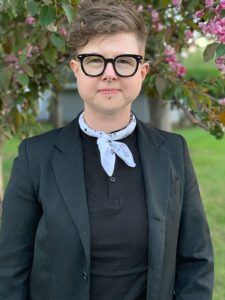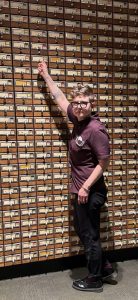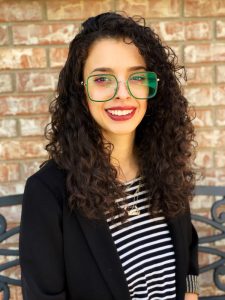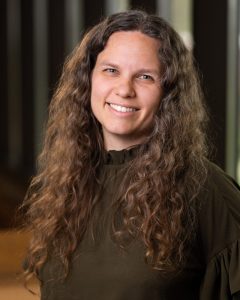For many students finishing up the fall semester this year, they are the first in their family to attend college.
Nationwide, almost half of first-time bachelor’s degree recipients have parents who have not earned a bachelor’s degree – 42 percent in the 2015-16 academic year, according to the most recent findings from the National Center for Education Statistics.
First-generation college students are more likely to be racial minorities, parents, caregivers, veterans, first-generation Americans, or come from a low-income background.
To celebrate first gen week at the University of Minnesota, the Libraries wants to recognize just a few of our amazing first gen faculty and staff.
Meet Wanda Marsolek
Marsolek is a data curation librarian. They attended the U of M as an undergraduate before receiving their master’s degree at Dominican University.
 “I preferred to hang out with the adults when I was a kid, and this followed me as I grew up, tending to hang out with the older kids. When I was in 9th grade I was friends with a bunch of the seniors and attended a college visit with one of them to the University of Minnesota – Twin Cities.
“I preferred to hang out with the adults when I was a kid, and this followed me as I grew up, tending to hang out with the older kids. When I was in 9th grade I was friends with a bunch of the seniors and attended a college visit with one of them to the University of Minnesota – Twin Cities.
“This 9th grader loved the campus, the green spaces, and all the people. Three years later, UMN was the only school I applied to because of well, fees. And lucky for me, they admitted me. It was the large campus, the large class size, and the large city for me. My hometown had less than 1,500 people when I lived there, and my high school graduating class had 57 students. Some of us look for anonymity to steer us toward our chosen community and family. I had no idea what to expect or what I was doing.
“My first year at UMN was the final year of quarters. I started school weeks later than all of my high school classmates attending the Univeristy of Wisconsin system schools. The first day of class was Sept. 24. We received our first bill on Sept. 25 and had to have 30 percent of it paid by Oct. 30. I had no clue whatsoever that I had to pay for school as I went along. I had heard of student loans and knew I would have them, but I really thought they sent you a bill after all was said and done. I had no idea that I had to apply for a loan and neither did anyone in my family. I lived in Sanford Hall, floor eight and had a view of the Minneapolis skyline. I walked myself over to Fraser Hall and agreed to the financial aid (AKA loans) that they recommended.
 “I was at the College of Liberal Arts, majoring in Journalism during my first year. During summer break I watched the movie “Up Close and Personal” and was disturbed by some of the ethics and decided journalism wasn’t going to work for me.
“I was at the College of Liberal Arts, majoring in Journalism during my first year. During summer break I watched the movie “Up Close and Personal” and was disturbed by some of the ethics and decided journalism wasn’t going to work for me.
“I had been taking a women’s studies class that really opened my eyes and changed my major immediately. The readings, the reflections. I had never been in conversations like this, and it was life changing. I attended every class. I was too scared to skip. I did the readings for every class. Did every assignment.
“The summer between my first and second year, I went home to Wisconsin and worked on the line at Ashley Furniture. That was the last summer I went home. I found part-time jobs donating plasma and later working at the same plasma center, then recruiting mock jurors across the country for a law consulting firm, working overnights at a condominium desk, delivering audio-visual equipment across campus (prior to all the classrooms having their own technology), and retail. Because of needing to work, I didn’t participate in any clubs or extracurriculars.
“I feel like I made mistake after mistake, but I don’t think I would take any of it back. All those experiences, good and bad, have made me into the person I am today.”
Meet Paloma Barraza
Barraza is our newest history, Iberian, and Latin American studies librarian. She went to the University of Colorado-Boulder, earning a bachelor’s in history, art history, and Italian. Afterwards she got a master’s in art history from the University of New Mexico, and a master’s in library and information science at the University of Arizona.
 “I am a first-generation college graduate and now one of the ~7 percent of Latinx librarians in the United States. My parents moved to the United States in the early 1990s to seek special care for my older brother, who is on the autism spectrum.
“I am a first-generation college graduate and now one of the ~7 percent of Latinx librarians in the United States. My parents moved to the United States in the early 1990s to seek special care for my older brother, who is on the autism spectrum.
“I have always been a lover of reading and from an early age, my mother would take me to the public library every Saturday so I could check out books. I had the privilege of freely attending school, a luxury that my parents did not have.
“They always instilled in me to educate myself to have better opportunities in the world. My parents unconditional support pushed me to explore history as a career – a career that I did not know I could choose. I am a scholar at heart, and I am excited that I have the opportunity to be a liaison for scholars here at the University of Minnesota.”
Meet Amy Drayer
Drayer is a user interface developer and has worked in systems and web development for over 15 years. She’s an alum of the College of Liberal Arts at the U of M, where she received a bachelor’s in classical civilization. She then attended the University of Wisconsin-Madison for her master’s in library science.
 “A high school counselor had taken notice of my grades and recommended I sign up for post-secondary enrollment options, which allowed me to take college classes at the University of Minnesota – Duluth while still in high school.
“A high school counselor had taken notice of my grades and recommended I sign up for post-secondary enrollment options, which allowed me to take college classes at the University of Minnesota – Duluth while still in high school.
“She suggested I apply for scholarships, consider a career field, and apply to multiple colleges. I would go with my mom to her work at 3 a.m., where she cleaned, so I could use a typewriter for the applications before school.
“I chose the University of Minnesota and had enough scholarships to pay for my education. Despite early struggles, like understanding how to be academic, and how to write or perform academically, I earned a bachelor’s with two minors in three years, and I was able to get a project assistantship that paid for my graduate school at the University of Wisconsin – Madison. After working in special, military, and public libraries, I returned to the U to support academic libraries.
“My advice for other first-gen students: always believe in yourself and know that you are worth it. It may feel like you don’t belong, like others ‘get it’ and you don’t, so find a person or two – a counselor, a librarian, a classmate – who can help or make you feel supported.”




